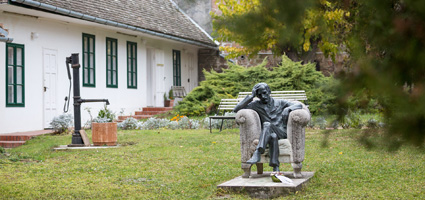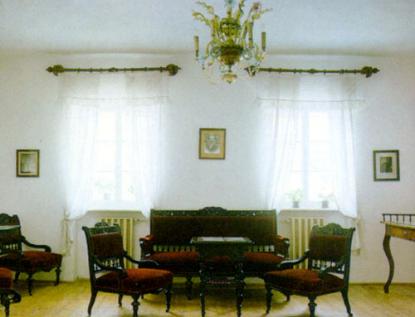2024. November 24. Sunday
Mihály Babits Memorial House - Szekszárd
 |
Address: 7100, Szekszárd Babits Mihály utca 13.
Phone number: (74) 312-154
E-mail: wmmm@terrasoft.hu
Opening hours: Temporarily closed.
|
Museum tickets, service costs:
|
Ticket for adults
|
500 HUF
|
|
|
Ticket for students
|
300 HUF
|
|
|
Ticket for pensioners
|
300 HUF
|
Babits lived here upto the age of six only, bur later as a student and young teacher very often spent the summer holidays at home. The exhibition on the ground floor is a revival of the atmosphere end characters of his novel "Halálfiai", an autobiography of Babits.

The first room was his mother's, and this is the room where the poet was born. in the living room next to it, beside the red covered sitting furniture stands the writing desk of his grandmother (Innocentia Raácz). On the top of it are written some notes of the grandmother from the book "Halálfiai" and next to this the first poem of Babits, written to his father, can be seen.
The third room was the poet's in his childhood, and also later, when he returned home. Near to the window is a chest of drawers with a modifiable top. This was the writing table of the young poet, and served as a hiding place as well for his early writings. Next to this is an old armchair - the "thinking chair" - in which the young writer-poet liked to sit, There is a small adjoining room to the poet's. The door between the two rooms was kept open at all times, as it was Babits' habit strolling these rooms up and down while thinking on a new poem.
Upstairs documents, manuscripts and photos are illustrating the life and career of Babits. The last two rooms are containing the remaining pieces of the poets library. The majority of his library was destroyed by fire during the second World War in Budapest.

The first room was his mother's, and this is the room where the poet was born. in the living room next to it, beside the red covered sitting furniture stands the writing desk of his grandmother (Innocentia Raácz). On the top of it are written some notes of the grandmother from the book "Halálfiai" and next to this the first poem of Babits, written to his father, can be seen.
The third room was the poet's in his childhood, and also later, when he returned home. Near to the window is a chest of drawers with a modifiable top. This was the writing table of the young poet, and served as a hiding place as well for his early writings. Next to this is an old armchair - the "thinking chair" - in which the young writer-poet liked to sit, There is a small adjoining room to the poet's. The door between the two rooms was kept open at all times, as it was Babits' habit strolling these rooms up and down while thinking on a new poem.
Upstairs documents, manuscripts and photos are illustrating the life and career of Babits. The last two rooms are containing the remaining pieces of the poets library. The majority of his library was destroyed by fire during the second World War in Budapest.
|
Related activities
|
|
